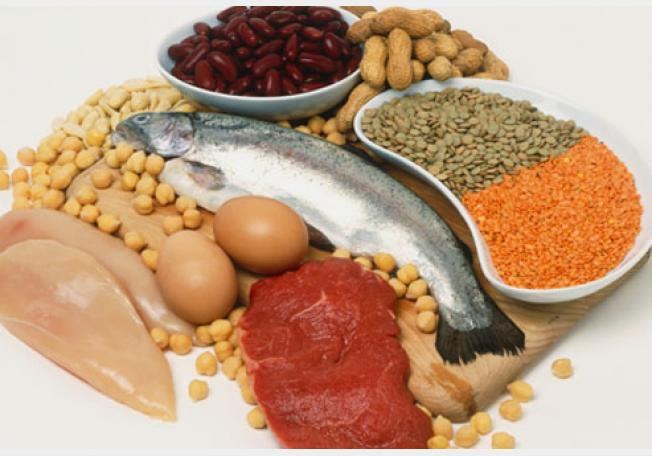Protein is a compound of amino acids, without which there is none of the metabolic processes in the body, whether it is processing vitamins, the assimilation of vital substances, renewal or rejuvenation. There are more than a hundred types essential and nonessential amino acids forming the proteins that enter the body in the form of animal or plant food components. Each of them is synthesized by various tissues, that is, "works" over its specific task. The processing of proteins derived from plants differ from their animal counterparts, because the ratio of their essential and nonessential amino acids is different.
Protein derived from animal products, is the most meaningful and useful for human body because it participates in the renewal and growth of muscle tissues and cells of the epidermis. But to use it in huge quantities, as it creates a high load on the organs that are responsible for displaying the products of its decay – the kidneys and liver. The main source of protein of this type serve meat and fish, dairy products, eggs, they contains up to 25% protein by weight. And fish is absorbed much faster, has virtually no medical contra-indications and contains the maximum amount of vital vitamins and other useful microelements. The highest protein content among meats is rabbit and poultry meat.
The protein contained in plants, is responsible for the cardio-vascular system, reduces the risk of plaque formation and excretes food processing and breakdown of fat. More protein is contained in fruits, legumes (peas, soybeans, beans, lentils, corn), nuts, grains and potatoes. In addition, they consist of a unique fiber, which normalizes the level of sugar in blood and the gastrointestinal tract. The speed and quality of assimilation it far exceeds animal. But one type of protein will not bring the desired value and impact, that is, they must be combined.
Excess protein, as the lack of it, affect the quality of the human body. The lack of this important element leads to decreased functionality of the liver, endocrine, lymphatic and nervous system, pancreas and intestines. Excess protein compounds disrupt the metabolism and blood circulation, and reduce working capacity and immunity, in addition, excess protein leaches calcium from bone tissue, can interfere with the absorption of many vitamins and has a bad effect on the muscles of the heart.
Animal proteins
Protein derived from animal products, is the most meaningful and useful for human body because it participates in the renewal and growth of muscle tissues and cells of the epidermis. But to use it in huge quantities, as it creates a high load on the organs that are responsible for displaying the products of its decay – the kidneys and liver. The main source of protein of this type serve meat and fish, dairy products, eggs, they contains up to 25% protein by weight. And fish is absorbed much faster, has virtually no medical contra-indications and contains the maximum amount of vital vitamins and other useful microelements. The highest protein content among meats is rabbit and poultry meat.
Vegetable proteins
The protein contained in plants, is responsible for the cardio-vascular system, reduces the risk of plaque formation and excretes food processing and breakdown of fat. More protein is contained in fruits, legumes (peas, soybeans, beans, lentils, corn), nuts, grains and potatoes. In addition, they consist of a unique fiber, which normalizes the level of sugar in blood and the gastrointestinal tract. The speed and quality of assimilation it far exceeds animal. But one type of protein will not bring the desired value and impact, that is, they must be combined.
The imbalance of protein in the body
Excess protein, as the lack of it, affect the quality of the human body. The lack of this important element leads to decreased functionality of the liver, endocrine, lymphatic and nervous system, pancreas and intestines. Excess protein compounds disrupt the metabolism and blood circulation, and reduce working capacity and immunity, in addition, excess protein leaches calcium from bone tissue, can interfere with the absorption of many vitamins and has a bad effect on the muscles of the heart.


